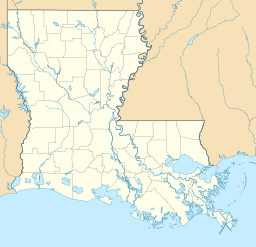Grassy Lake (Louisiana) facts for kids
Quick facts for kids Grassy Lake |
|
|---|---|
| Location | St. Martin and Assumption, Parishes, Louisiana, US |
| Coordinates | 29°46′40″N 91°06′37″W / 29.7779°N 91.1104°W |
| Type | Natural lake |
| Basin countries | United States (Watershed HUC 8080101) |
| Surface area | 414 ha (1,024 acres) |
| Average depth | 1.8 m (6 ft) |
| Max. depth | 2.7 m (9 ft) |
| Shore length1 | 12.400 km (7.705 mi) |
| Surface elevation | 0 m (0 ft) |
| Settlements | Morgan City |
| 1 Shore length is not a well-defined measure. | |
Grassy Lake is a natural lake located in Louisiana, USA. It covers about 1,024 acres, which is like 775 football fields! The lake is mostly in St. Martin Parish, but a small part of Assumption Parish touches its eastern side.
Grassy Lake is part of a much larger water system. This system includes Lake Verret and Lake Palourde. All these waters eventually flow into the Atchafalaya River and then make their way to the Gulf of Mexico.
Contents
History of Grassy Lake
Around the late 1700s and early 1900s, people living near Grassy Lake faced a big challenge. They needed to move their farm crops, especially sugar cane, to markets. Back then, there were no big trucks or highways.
Moving Crops by Water
Boats were the main way to transport goods. They traveled on bayous, lakes, canals, and rivers. But sometimes, the water levels were too low for boats to move easily. When this happened, teams of strong oxen would help.
Cordelle Roads and Canals
Special paths called "cordelle roads" were built along the banks of waterways. The oxen would walk on these roads and pull the boats through the water. One important route was the Attakapas Canal. This canal was about ten miles long. It connected Bayou Lafourche near Napoleonville to Lake Verret. From Lake Verret, boats could reach the Atchafalaya River. They would pass through Fourmile Bayou, Grassy Lake, and then through areas like Simon or Persimmon passes to get to Lake Palourde. This network of waterways was vital for trade and travel.
Plants in Grassy Lake
Scientists from the Louisiana Department of Wildlife and Fisheries (LDWF) have studied the plants in Grassy Lake. They checked the lake in 2005 and again in 2006.
Aquatic Vegetation Survey
During their surveys, the water in Grassy Lake was quite clear. They found that there were no plants growing completely underwater. However, they did find several types of plants floating on the surface or growing along the edges.
Common and Invasive Plants
Some of the plants found in Grassy Lake are considered "invasive species." This means they are not native to the area and can sometimes grow too much, harming the local environment. These include:
- Common salvinia
- Common water hyacinth
- Water lettuce
- Alligator weed
- Water-primrose
Other plants found, like Duck Potato (also called arrowhead) and cutgrass, are native. Cutgrass can be helpful to the environment, but it can also grow very thick and become a nuisance if not managed.
 | Delilah Pierce |
 | Gordon Parks |
 | Augusta Savage |
 | Charles Ethan Porter |



